“The old church with its sharp steeple, roots slowly, decently, prosperously, like a good man’s life, down into its wet lichened brick.” — Thomas Wolfe, Look Homeward, Angel
They stand like a trinity of silent sentinels, surveying every sinner, saint and stranger who ventures down Church Street. Erected by the hand of man more than a century ago, the limestone exterior of Central United Methodist and the weathered bricks of First Presbyterian and Trinity Episcopal now seem to be as rooted there as the mature trees that line the stately street. But while people still fill the pews on Sunday mornings in search of the sacred, pastors at these historic churches fear that changes in the wider world could undermine those devoted congregations.
An October study by the Pew Research Center’s Forum on Religion & Public Life found that one-fifth of the nearly 3,000 respondents, and one-third of the adults under 30, identified themselves as unaffiliated with any religion — the highest percentages since the forum began asking these questions more than a decade ago.
And in a just-released Pew study that was international in scope, about one in six respondents said they had no religious affiliation.
To varying degrees, most American faith groups must confront that reality, but the decline seems to be concentrated among white Protestants. In a 1972 survey of Americans by the University of Chicago’s National Opinion Research Center, 62 percent of respondents identified themselves as Protestant. In a 2010 Pew survey, however, that figure had dropped to 51 percent.
Against that dramatically shifting sociocultural backdrop, each of these landmark institutions is seeking to chart a new course while staying true to its spiritual roots.
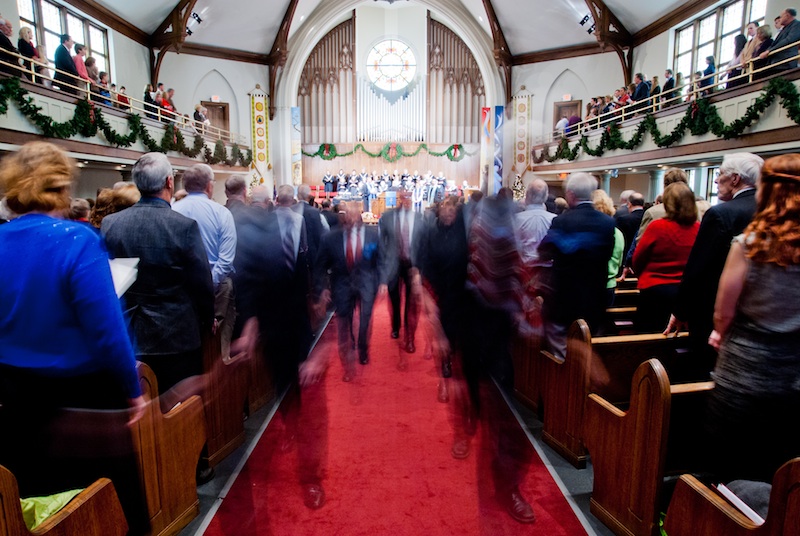
Full pews: Central United Methodist Church has close to 3,000 members in its congregation. However, in a national study by Pew Research Center, more than half of respondents said religious institutions are too concerned with money, power and rules. (photo by Max Cooper)
Shoulder to shoulder
Pastors at Central United Methodist, said to be the city’s oldest continuously operating congregation, say the old-school, high-church style of worship cannot be the only way for people to have a relationship with the divine.
“We want to be attentive to what’s happening across the globe,” says the Rev. Julie Wilburn Peeler, the minister of congregational care. “We are in this seismic shift in all ways, and the church is experiencing that too — and, consequently, so is the way we do church.”
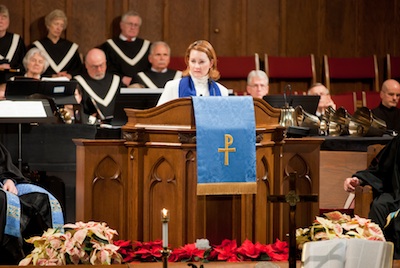
‘In this seismic shift’: The Rev. Julie Wilburn Peeler of Central United Methodist says the historic church is trying to find new ways for people to worship. (photo by Max Cooper)
Central United Methodist, she notes, is in the early stages of establishing “house churches” where people gather informally to pray and learn more about Scripture.
“Though they may never walk through these halls, that’s OK. Their community of faith is that house church. We are trying not to be so rooted in the institution that we can’t hear the Spirit moving,” Peeler reveals.
That’s one of the reasons for the organ music that issues from the Haywood Street Congregation on Wednesday afternoons. Central United Methodist owns the building at 297 Haywood St., but Haywood Street’s pastor, the Rev. Brian Combs, says his church tries to redefine how Christian discipleship and worship should look and sound.
“If church is supposed to look like the context it’s in, being in the middle of the homeless corridor downtown, we look like what’s around us, and that’s what we want to be,” he explains. “Faith is a verb for us. We’re not a church with a Mission Committee: We’re a Mission Committee that happens to be a church.”
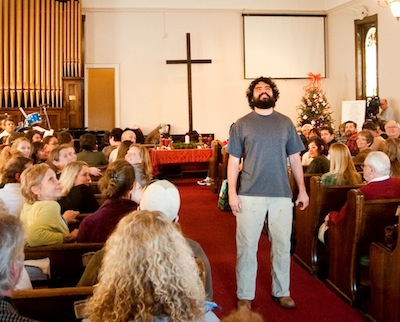
Faith for all: The Rev. Brian Combs of the Haywood Street Congregation talks to people sitting in the balcony during last year’s memorial service for the homeless. The nontraditional congregation meets Wednesdays from 12:30 to 1:15 p.m. (photo by Bill Rhodes)
The congregation was formed in 2009 to provide a worship service for all people, especially those in poverty, during the work week. The midday time, notes Combs, came from a conversation he had with a man on the street who told him, “In the middle of the day, I have all this idle time. I would rather hear the good news than get high.”
At the weekly service, the prosperous people in suits sit shoulder to shoulder with homeless folks in sweats — and the pews are usually full.
Changing minds
Similarly, says the Rev. Mark Burnham, First Presbyterian’s Church Street location shapes the way that institution helps its congregation keep the faith.
“I think our mission is informed by our worship life together. … It’s not for gathering in, circling the wagons and hiding out. It’s where you’re both inspired and challenged, and then you’re sent back out.”
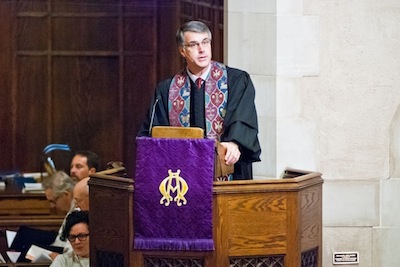
From the pulpit: The Rev. Mark Burnham of First Presbyterian says counting membership numbers is not the best measure of a successful church. Going forward, he says congregations need to be authentic and honest. (photo by Max Cooper)
But having and sharing faith, he stresses, also means creating a space within the church for people in need. First Presbyterian continues to be a meeting place for Alcoholics Anonymous, Narcotics Anonymous, the Boy Scouts and the A HOPE Day Center for the homeless. In the long run, argues Burnham, serving as a home base for different community groups could help change some minds about organized religion.
“In a lot of the mainline churches,” Burnham maintains, “you have less of that class distinction” than in the past. “It used to be if you were Episcopal or Presbyterian or Methodist, you were a little more established, and I think a lot of that is changing. I think … the downtown location gives you that opportunity. You have more of a connection with people and interchange with people who may be from different places in life than you are.”
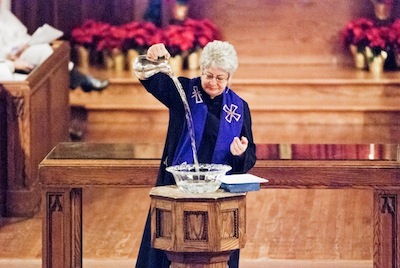
Photo by Max Cooper
With that opportunity, however, comes a kind of near invisibility, says Burnham, noting that the city’s Downtown Master Plan makes no reference to faith communities except in connection with parking problems at the Basilica of St. Lawrence.
“They talk about the entertainment district, the business district and the historic district, but churches and faith communities aren’t mentioned once,” he points out. “But I think if you took away all of the work, all of the funding and all of the volunteer hours that churches and synagogues and faith communities do in downtown, you’d have a huge gap.”
Living the mission
The Rev. R. Scott White has been preaching at Trinity Episcopal Church only since October, but he understands that a downtown location necessarily entails different challenges than what suburban churches face.
“A downtown congregation is confronted with the realities of city life, and we know that, and we believe that we’ve been called to be here to meet those needs and those concerns,” he says. “We’re seeking to live out that mission as it’s been given to us.”
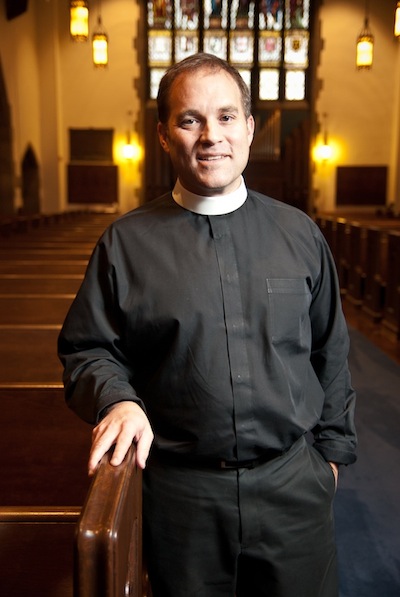
A downtown message, mission: The Rev. R. Scott White began preaching at Trinity Episcopal in October and says that downtown churches face unique challenges. (photo by Max Cooper)
But for these three historic churches, the overarching question seems to be what the future holds in store for them as more and more people lose interest in organized religion. According to the October Pew study, titled “Nones on the Rise,” two-thirds of respondents said religion as a whole is losing its influence on American life. About 8 percent said they hadn’t been raised in any religious tradition. Nonetheless, White still believes religious communities serve a broader community that’s not limited to their actual membership.
Surrounded by the 18 stained-glass windows that architect Joseph A. Miller designed more than 100 years ago, White strides down the aisle, past the pews and toward the hallway to turn off the lights in the sanctuary. As weak winter sunlight penetrates the glass, casting subtle hues across the azure carpet, he says: “I think there’s a lot of faith communities that have old, pretty buildings like the ones on Church Street. They look imposing and they look threatening, and yet for generations, hundreds and thousands and hundreds of thousands of people have been supported and lifted up in these places by the love of God.”
In other words, he continues, what lies at the core of traditional religion is something central to the human experience that transcends even the current global shift — and may even, ultimately, support it.
“If you really want to be countercultural, if you really want to go against the grain, if you really want to stand out in the crowd and speak truth to the power structures of the world and the individualism of the human heart, then Jesus is your man. And those of us who show up at pretty church buildings on Sunday mornings looking like we’re all put together really aren’t. We, too, are seeking something more than we can accomplish by our own strength. We, too, are seeking a way to cut through the veneer of life to that which really matters.”
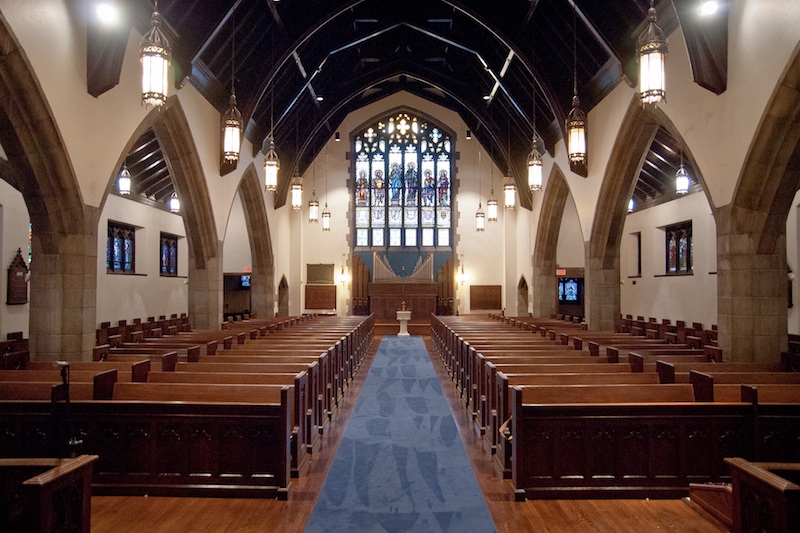
Trinity Episcopal interior (photo by Max Cooper)
Caitlin Byrd can be reached at 251-1333, ext. 140, or at cbyrd@mountainx.com.

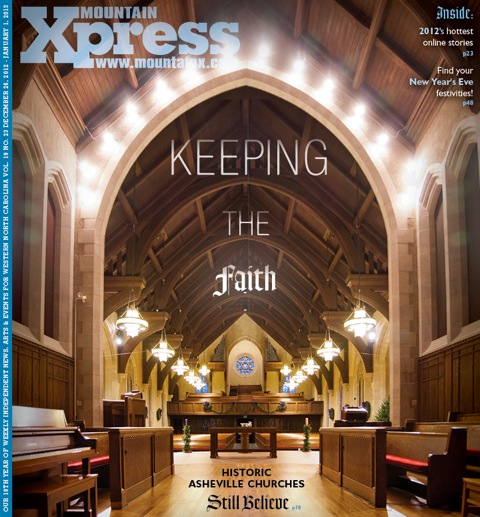


Before you comment
The comments section is here to provide a platform for civil dialogue on the issues we face together as a local community. Xpress is committed to offering this platform for all voices, but when the tone of the discussion gets nasty or strays off topic, we believe many people choose not to participate. Xpress editors are determined to moderate comments to ensure a constructive interchange is maintained. All comments judged not to be in keeping with the spirit of civil discourse will be removed and repeat violators will be banned. See here for our terms of service. Thank you for being part of this effort to promote respectful discussion.